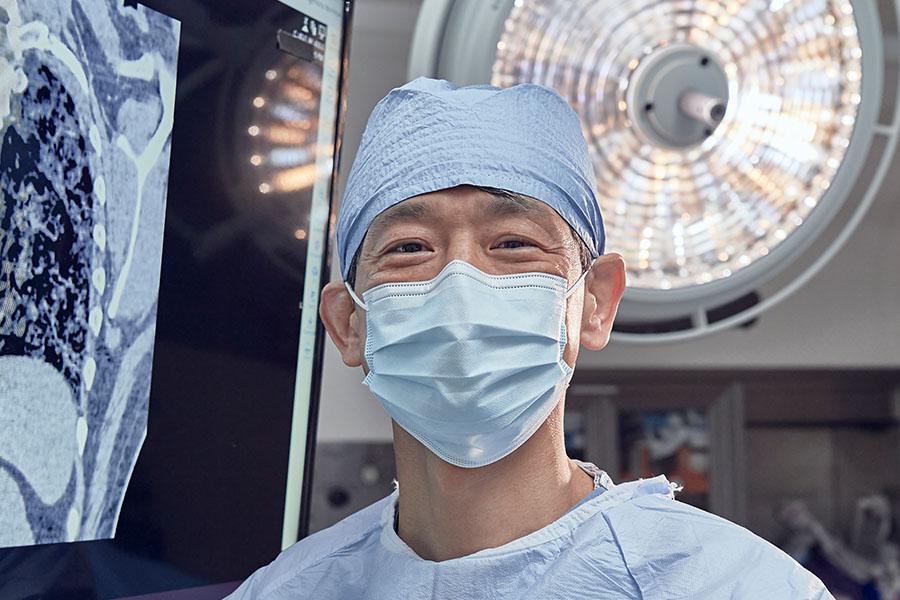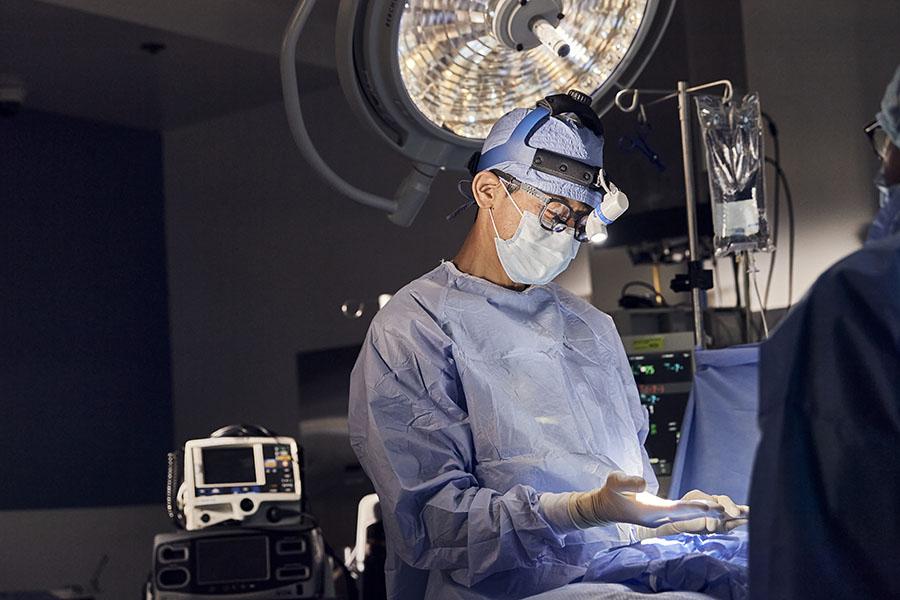Matt M. knows the importance of staying active. As an exercise physiologist at Temple Health, he helps patients with lung disease improve their condition and quality of life through pulmonary rehab.
Matt’s seen the power of exercise in his personal life too. His dad, David, is a dedicated athlete—he’s a soccer coach, a former Olympic athlete, and a former professional soccer player. And after David’s recent lung transplant at the Temple Lung Center, Matt saw how that dedication helped his dad make the most of his post-transplant recovery and get back to the sport he loves.
A Shocking Diagnosis
A lifelong athlete, David doesn’t fit the stereotype of a person who needs a new organ. But that’s just where he found himself.
“It was a shock,” he says. “I had COVID-19 in November 2020 and went into the hospital for five days. I had no issues."
But after returning home, David's condition worsened. "I couldn’t walk. I was out of breath. I went to the nearest ER and requested a transfer to Temple University Hospital.”
It turned out David had two blood clots in his lung. After another 10 days in the hospital, he returned home, on oxygen and in an ambulance.
David underwent extensive testing, and on New Year's Eve, pulmonologist Gerard J. Criner, MD, FACP, FACCP, told him the results: David would need a lung transplant.
“It shocked my world,” David says. “I was never on oxygen before. I had a pre-existing condition, and, with COVID-19, it did real damage.”
Lung Transplant Evaluation
A lung transplant can help patients with serious lung disease breathe better and improve their quality of life. It’s a complex procedure and requires extensive testing and evaluation before a patient is considered a viable candidate.
“It’s stressful because you have to qualify and make sure everything is in order,” David says. “There is a litany of tests to make sure you’re able to do it.”
When David started this evaluation process in January 2021, he knew he was in good hands at the Temple Lung Center. A national leader in caring for patients with complex conditions, the lung transplant team at Temple already had experience treating patients with post-COVID-19 lung damage.
The team determined that David definitely needed a new lung and that he was healthy enough to thrive after surgery. He was given a Lung Allocation Score (LAS), which determined his placement on the United Network for Organ Sharing (UNOS) lung transplant waiting list.
There’s no way to know when a lung will be available for transplant; people can wait months or even years. But David didn’t just sit around and wait for the phone to ring. With his son Matt’s help, he “trained” actively for the transplant.
Preparing for Transplant and Surgical Success
Patients who are in the best physical and emotional shape possible often have better outcomes after transplant. As an exercise physiologist, Matt sees this every day.
“Patients who stay active tend to do well,” he says. “My dad was exercising more so he could have a smooth recovery.”
However, that exercise looked different than what the always-athletic David was used to.
“It was tough to stand up for a minute because I was in bed,” he says. “Matt helped me out a lot because he deals with it every day. He gave me a program to follow and said my recovery will be a lot better if I walk and work out. I had a 100-foot tube on my breathing machine, so I was walking around my house every day to build stamina.”
After just six weeks, David received the call.
“Finding out there was a lung available, my reaction was twofold,” he says. “Really a lot of excitement and joy, and then wondering. You have major surgery ahead of you, and it’s a shock. At least for me, I was happy and then in one breath felt like someone knocked the wind out of me.”
David got to the hospital quickly, and cardiovascular surgeon Yoshiya Toyoda, MD, PhD, performed the transplant. The surgery went well, and David was soon on the road to recovery.
Thriving After a Transplant
David and Matt are both pleased with the process and thrilled with the result.
“I couldn’t be happier,” David says. “From Dr. Criner letting me know that I needed a transplant and afterward making sure I’m doing all the right things, and Dr. Toyoda — both of them are world-renowned for their expertise. So I was very fortunate that I had both of those guys helping me.”
His son agrees.
“They’re phenomenal,” Matt says. “I see the outcomes before and after the transplant, and I’m always hearing patients speak so highly of their nurses and respiratory therapists, in addition to the pulmonologists and surgeons. They couldn’t be any better. I continuously hear that they wouldn’t go anywhere else for lung or heart transplants. Temple is the place to be.”
David’s experience has also given Matt unique insight into what people he works with go through.
“I’m very happy where I am, and continuing to help patients get their life back means a lot to me, especially seeing my dad go through that experience,” he says. “As I’m helping other patients who are under stress, thinking about a transplant, I can share that I have a family member who went through it and what they have to look forward to after the transplant.”
Matt figured his dad would recover well. But even he has been impressed by David’s post-transplant lifestyle. While transplant patients need to take extra precautions to protect their skin from excessive sun exposure, David is able to get back to his favorite outdoor daily activities.
“He’s on the soccer field every day coaching,” says Matt. “Even on weekends, he’s traveling. Most patients I work with don’t do that. He definitely got his life back. He’s working in his backyard and cleaning his pool. It’s amazing.”
David doesn’t think he’s that special. But he’s happy to share his experience with people who are facing a transplant.
“What I say is just that you’ve got to work hard, as Matt told me. You’ve got to be in shape,” he says. “It’s going to change your life.”
He’s also quick to acknowledge his care team and his gratitude toward his organ donor.
“I know so many people in this situation,” David says. “I also think it’s important that people donate organs. The more people who donate, the more they are able to help someone like me.”
Helpful Resources
Looking for more information?




